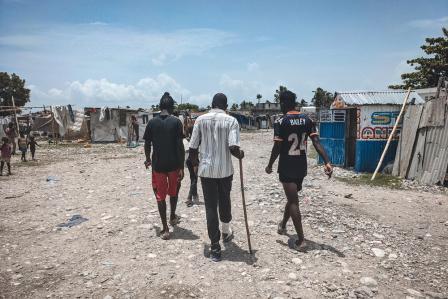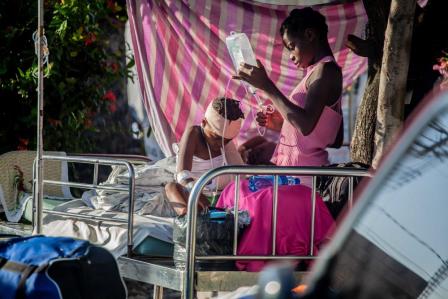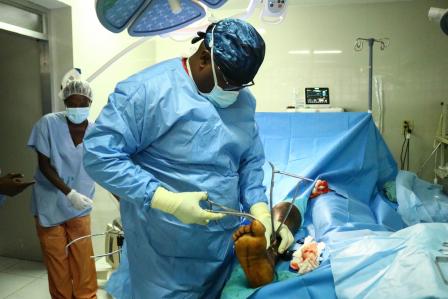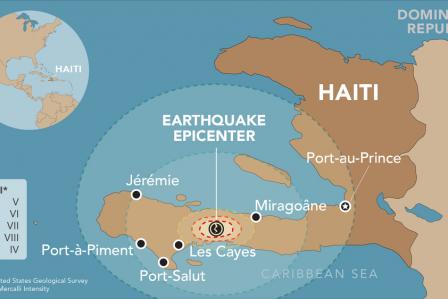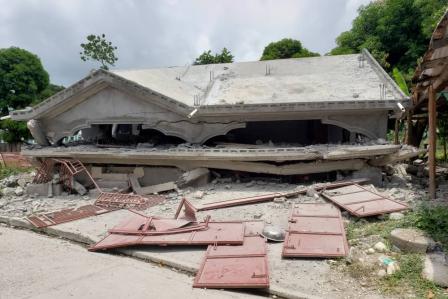Haiti: After the earthquake, a multitude of challenges for patients
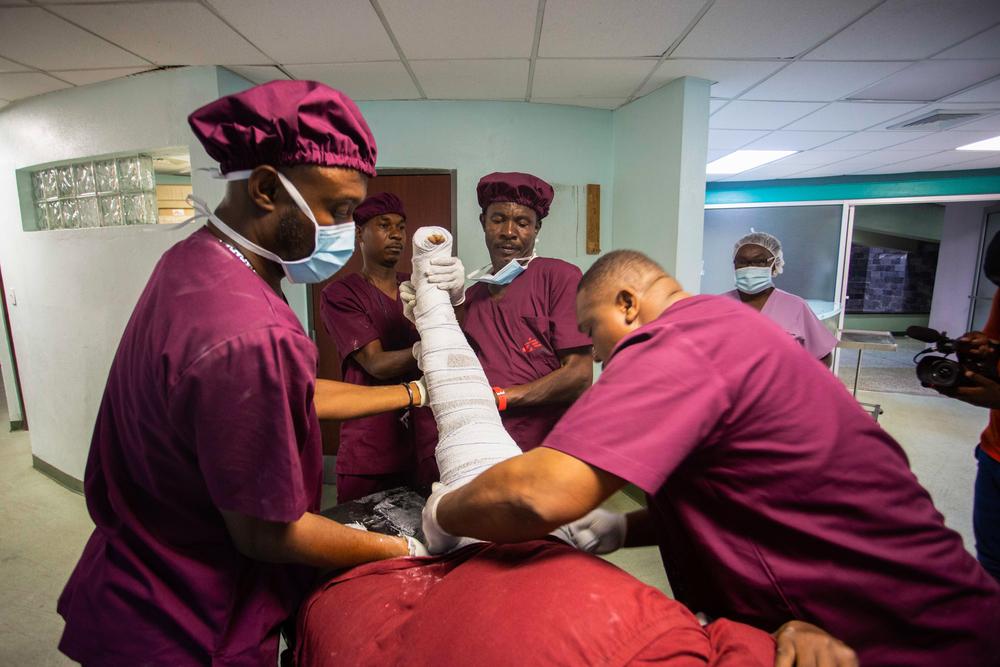
Medical team from Tabarre hospital is attending a patient, wounded during the earthquake. © Steven Aristil
The 7.2 magnitude quake began at 8:29 a.m. local time on August 14 and ended a few minutes later. In those terrible moments, as walls and roofs collapsed in hard-hit areas of southern Haiti, more than, 2,200 people were fatally wounded, and more than 12,000 people were injured. Survivors such as Widnika began a long journey of recovery from physical and emotional trauma.
After Widnika's family's house collapsed, neighbors in their town of Camp-Perrin helped free him from the rubble, and his mother accompanied him first to a local hospital and then to Doctors Without Borders' Tabarre hospital on the same day. For days, earthquake survivors from southern Haiti continued to arrive in the capital, Port-au-Prince, coming through the national ambulance system, by their own means of transportation or on helicopters and planes that were rapidly called into service.
In the Turgeau neighborhood of Port-au-Prince, Doctors Without Borders opened an emergency center the day of the quake to stabilize patients evacuated from the south. In the first eight days, the center treated 133 earthquake survivors and 152 other patients. Eighty-two patients were referred to local hospitals for further treatment or surgery. Twenty-seven of these patients were referred to Doctors Without Borders' Tabarre hospital, which specializes in severe trauma or burns.
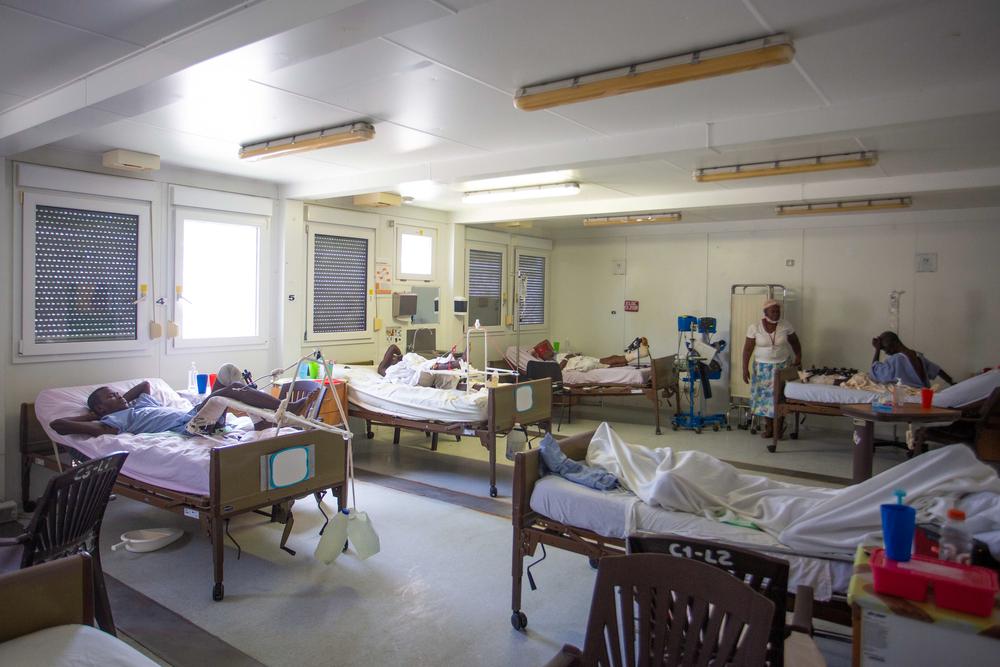
Several victims of the earthquake have been transferred to Tabarre trauma center for treatment. © Steven Aristil
When the earthquake struck, most of the beds at the Tabarre hospital were already occupied with its existing burns and trauma patients. The hospital then received a total of 70 survivors the earthquake in a matter of days, 48 of whom were admitted for surgery or other treatment. The needs exceeded the hospital's normal capacity of 70 beds, and the staff invoked their disaster plan—deploying 19 additional beds in covered areas of the courtyard and elsewhere inside the building.
At Tabarre, Widnika underwent surgery. The bones of his lower leg are now held in place by an external fixator—a medical rod installed outside his shin—as the they begin to grow back together. Widline expresses appreciation for the care provided to her son and sadness at the prospect of returning to a home that was destroyed. Their town, Camp-Perrin, is a five-hour drive from Port-au-Prince in normal times, and now roads are damaged across the region, making any travel much harder.
The many challenges that patients and their families face—medical, psychological and practical—pose thorny problems for the hospital staff who are responsible for ensuring that patients will have the care they require in the coming weeks and months. In southern Haiti, many hospitals are damaged and, for now, unable to provide the follow-up care that many earthquake survivors need.
"We are in the process of making contact with other organizations to ensure they can continue physiotherapy and psychological care when our patients return to their home communities. It is essential that patients with bone fractures have regular medical consultations to monitor how their bones are healing and make adjustments if necessary. We must assess whether hospitals have the capacity for radiography and other aspects of this care."
- Dr. Kanoute Dialla, Doctors Without Borders's coordinator of the Tabarre hospital.
There are many logistical challenges as well. Traveling from southern Haiti back to Tabarre would be very difficult, as roads have been heavily damaged by landslides. Many earthquake survivors have temporary or permanent disabilities as a result of their injuries, making such travel all the more arduous.
Elvie Pierre, Tabarre hospital social worker, keeps the patients connected with their families, who are a crucial source of emotional support. "Does anyone know you are in the hospital?" she regularly asks, getting out her phone if a call is needed. As patients' conditions improve and they prepare to be discharged, she asks if they have relatives that they can stay with in the city as they continue outpatient treatment.
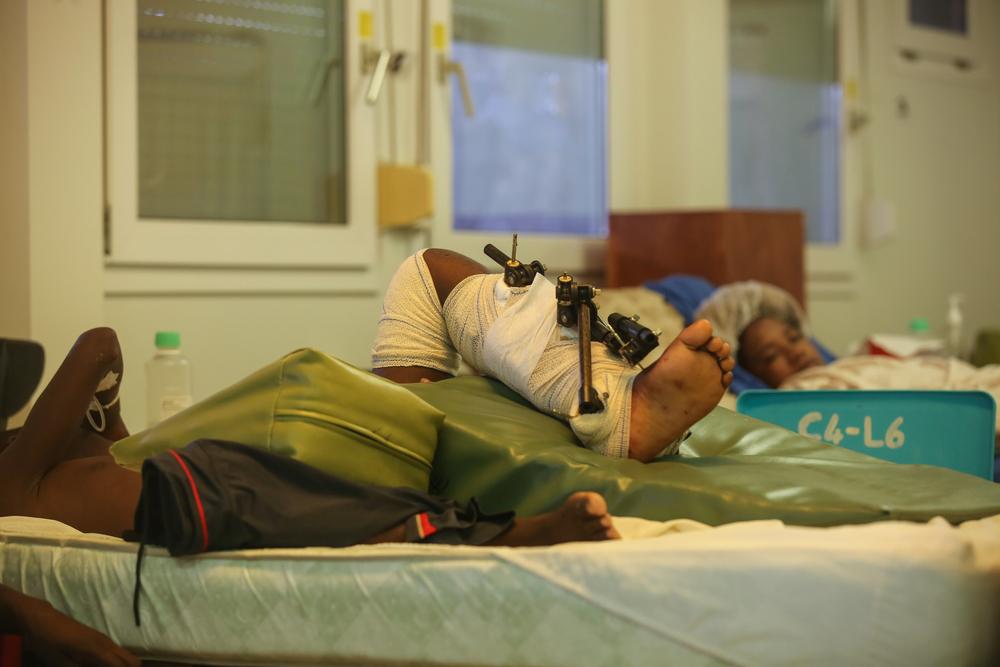
A victim from August 14 earthquake is being treated in Tabarre hospital after a referral from the South area, the most affected zone on Haiti. © Steven Aristil
Yet staying in Port-au-Prince for the long term is not an option for some patients. Many patients, coming from hours away, do not know anyone in the city. Lodgings in Port-au-Prince are often quite small, Pierre notes, and it can be difficult for relatives to accommodate an extra person. Doctors Without Borders has erected a tent in the hospital compound for discharged patients who cannot stay elsewhere.
"Given that the care of patients with trauma must continue with good postoperative follow-up, physiotherapy, psychological support, our teams want to be reassured that everything will be set up in the south before our patients return there," explains the Dr. Alain Ngamba, Doctors Without Borders medical coordinator in Haiti. "Before finding more long-term solutions, we plan to keep some patients here in Port-au-Prince by providing their accommodation to allow them to continue their care in our hospital in Tabarre."
Doctors Without Borders emergency teams are also now treating earthquake survivors in affected areas of the South, including in the cities of Jérémie and Les Cayes. These teams will help assess whether medical facilities in the region can provide follow-up care, Ngamba says.
For Widnika, questions about when to return to Camp-Perrin and what awaits him there are left for another day. As he lies in his hospital bed, he momentarily opens his bright eyes and looks around the hospital room, finding his mother's gaze before settling back to sleep.
As with many earthquake survivors, his healing process is now underway, but it may be a long one. Achieving a full recovery will depend on many kinds of support and perseverance.
